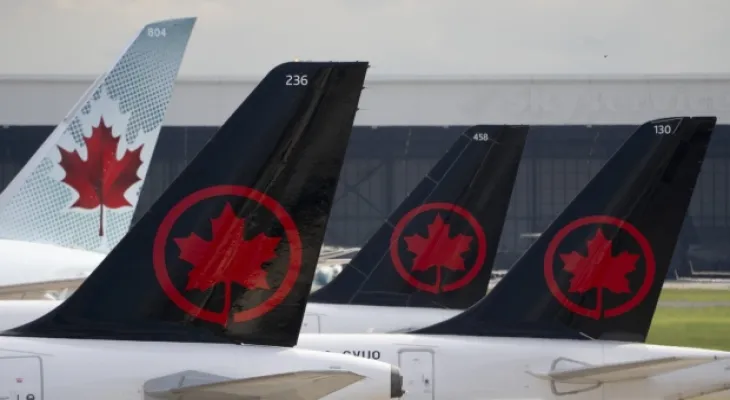Search here
Newspaper
Search here

Arab Canada News
News

Published: February 6, 2024
Lawmakers accused the CEO of Air Canada on Monday of failing to accommodate passengers with disabilities.
During a House of Commons committee hearing on services provided to Canadians with disabilities, CEO Michael Rousseau faced a barrage of questions regarding reports of passenger mistreatment last year.
Tracy Gray, deputy leader of the Conservative Party, cited several incidents she considered shocking: "An elevator fell on the head of an Air Canada passenger and her ventilator was disconnected; Air Canada left the wheelchair of the chief accessibility officer in Canada behind on a domestic flight... and a man fell and was injured when Air Canada staff did not use the elevator as required."
In August, a man with cerebral palsy was forced to drag himself off the plane due to a lack of assistance, a situation described as a "scandal" by Quebec Bloc MP Louise Chabot.
When asked by Bonita Zarrillo, the critic on disability inclusion for the New Democratic Party, whether he had ever had to crawl in the aisle or use a food cart to exit — referring to recent stories — he replied, "No, of course not."
She added, "We make mistakes."
Rousseau pointed to the accelerated accessibility plan announced in November along with new measures to improve the travel experience for hundreds of thousands of passengers with disabilities.
Last week, the carrier formed an advisory committee of customers with disabilities and launched a program where a wristband worn by travelers signals to staff that they may need assistance.
Rousseau said, "The vast majority of customers requesting accessibility assistance from Air Canada have a good experience, there are exceptions, and we take responsibility for those exceptions."
He apologized last fall for the airline's failures regarding accessible air travel.
Zarrillo pointed out that the shortcomings go deeper than mere accidental errors, saying the "institutional culture" of Air Canada and the lack of federal enforcement explain the mistreatment, even after regulatory reforms over the past five years.
Others suggested that the legislation itself needs further reforms.
Conservative MP Rosemary Vukcevic pressed Rousseau on whether the airline complies with all regulations after he initially responded, "I cannot answer that question at this time."
Once he responded yes, Vukcevic said the accessibility issues the airline faces despite the announced compliance with the law may indicate "significant flaws" in Canada's Accessibility Act, enacted in 2019.
However, Liberal MP Peter Fragiskatos said the issue seems more a matter of daily implementation than regulations or top officials' priorities.
He cited Jeff Preston, associate professor of disability studies at King's College, who wrote that Air Canada has modern accessibility frameworks, but "none of these policies are properly translated from corporate/legal affairs to front-line."
Rousseau held a similar view: "The main issue is inconsistency."
Complaints came from various angles.
In December, the Canadian Paralympic Committee, along with some athletes with special needs, called for better transportation to and from international competitions.
This call followed repeated complaints by Paralympic athletes regarding equipment damage or breakage, as well as flight delays for competitors from Canada trying to reach the Parapan American Games in Chile last November.
Last month, Air Canada appealed a decision by the country's transport regulator aimed at improving accessibility for travelers with disabilities. If successful, it would overturn a requirement to accommodate passengers whose wheelchairs are too large to be transported in the plane's cargo holds.
Under the three-year accessibility plan, Air Canada has committed to measures ranging from creating a customer accessibility manager position to continuous boarding of passengers requesting lift assistance first.
The Montreal-based company also aims to implement regular annual accessibility training — such as how to use the eagle lift — for its 10,000 airport employees. It also plans to include mobility aids in an app that can track baggage.
Rousseau said, "We have high awareness, a strong work ethic, and deep empathy among our employees and contractors."
He acknowledged that flight delays — a persistent obstacle at Air Canada, which ranked last in on-time performance last year among 10 major North American airlines — affect people with disabilities more. He said the recent measures taken by the company aim to "help alleviate this anxiety."
Accessibility advocates pointed to gaps in Canada's Accessibility Act, which they say consistently allow problems in areas ranging from consultation to assistance protocols.
Heather Walcus, who chairs the Council of Canadians with Disabilities, highlighted the lack of details about how employees are trained. She also cited a rule requiring federally regulated companies to involve persons with disabilities in policy, program, and service development — a "regulation you can drive through."
"You can send the official to Tim Hortons and talk to someone in a wheelchair and you've consulted with the disability community," she told Canadian press in November. She said Air Canada has not contacted the group she leads about its new accessibility plan."
Comments